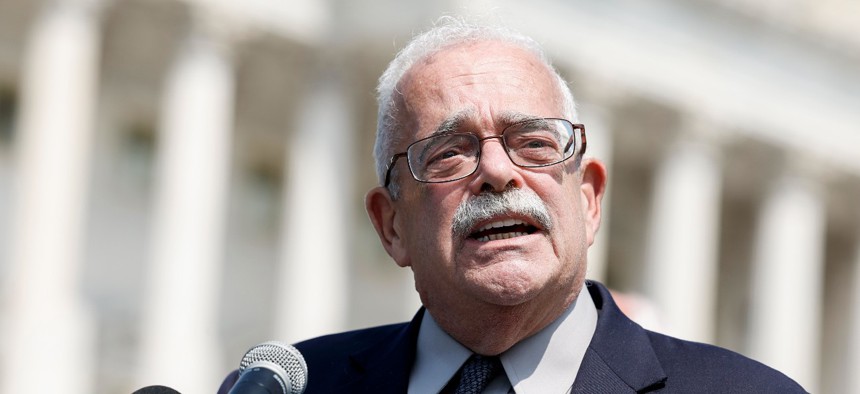
“These courageous men and women work grueling hours in the most difficult of circumstances,” Rep. Gerry Connolly, D-Va., said Tuesday, when he reintroduced the bill. Anna Moneymaker/Getty Images
Bill to Boost Federal Firefighters’ Retirement Benefits is Back
Rep. Gerry Connolly’s legislation would include mandatory overtime hours in calculations to determine federal firefighters’ pension benefits.
Rep. Gerry Connolly, D-Va., on Tuesday reintroduced legislation aimed at improving federal firefighters’ financial outlook in retirement by ensuring hours spent on mandatory overtime count toward the calculation of their defined benefit annuity.
Currently, the federal government’s firefighters work a 72-hour week, of which 19 hours are considered mandatory overtime. While they are paid time-and-a-half for their overtime service, when the government calculates their retirement pay, it treats all 72 hours as regular work time.
The Federal Firefighter Pay Equity Act (H.R. 1235) would require the government to treat time federal firefighters spend on mandatory overtime as overtime for the purposes of making their annuity calculations, which are based on an average of the highest three years of a retiring worker’s salary.
That change would put the federal government’s benefits for federal firefighters more in line with those offered by state and local governments, Connolly said. For years, federal agencies that employ firefighters have struggled through staffing shortages, due in part to the fact that the federal government offered lower pay and benefits than state and municipal fire departments, even as the demand for federal fire suppression has grown rapidly with the expanding wildfire season.
“These courageous men and women work grueling hours in the most difficult of circumstances,” Connolly said. “It is our absolute responsibility to provide them with a retirement worthy of the sacrifices they have made in service to the United States. Our legislation fulfills that responsibility and ensures that our retired federal firefighters are compensated fairly and fully.”
The bill also includes a new provision that would make another major change to federal firefighters’ working conditions. It tasks the Office of Personnel Management with developing regulations within a year to establish that firefighters’ “regularly reoccurring” workweeks max out at 60 hours, rather than the current 72 hours.
Edward Kelly, general president of the International Association of Fire Fighters, said the tweaks to both the retirement benefits and work schedules of federal firefighters will improve both their financial stability as well as their own health.
“Federal firefighters put themselves directly in harm’s way and save lives on a daily basis—all while working 72 hours per week,” he said. “It’s time they are paid a fair wage for their work, not one-third less than their state and local counterparts. Requiring federal firefighters to work such a grueling schedule exacerbates their risk for occupational injuries and burnout, and reduces their retirement earnings.”
Although legislation targeted at bringing the federal government’s retirement benefits for firefighters in line with state and local employers has been unsuccessful in each of the last three sessions of Congress, lawmakers have over the last two years been more keen to advance similar legislation, including the Federal Firefighters Fairness Act, which makes it easier for firefighters who have developed chronic health conditions to receive workers compensation benefits and was signed into law last December.







